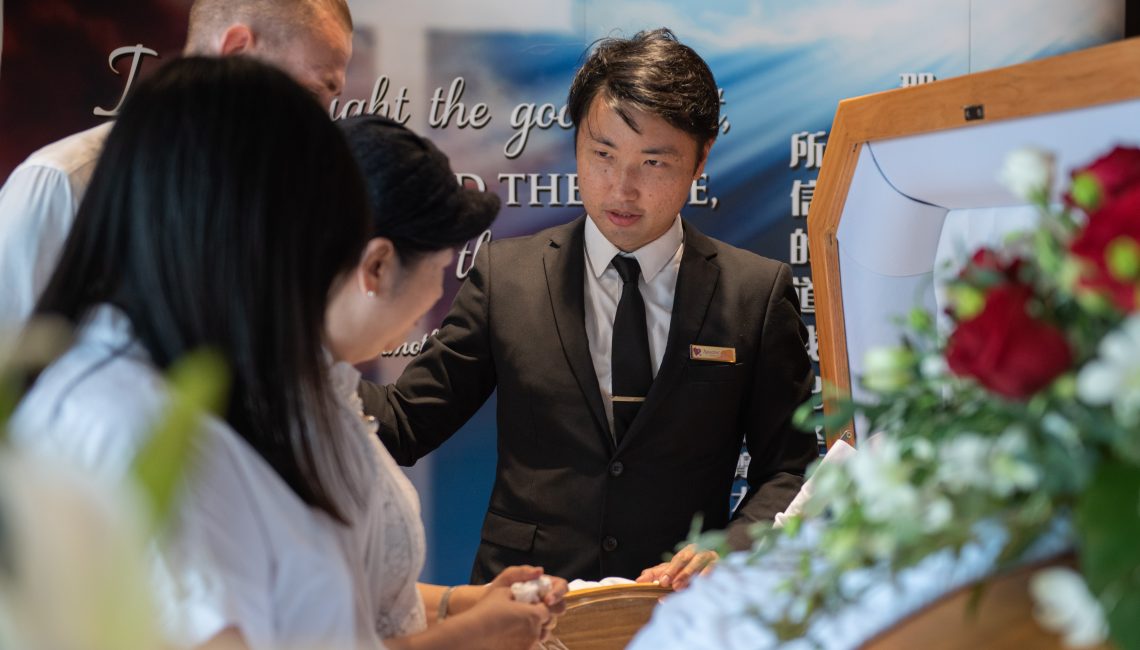This is an interview series with funeral directors in Singapore. Read about how they help you through a time of bereavement and get tips for choosing one when the need arises.
Obits.sg gets insider details from Daniel Wong of Amazing Grace Bereavement Care.
Why did you become a funeral director?
There are three key aspects that culminated into my becoming a funeral director.
Prior to becoming a funeral director, my family had been involved with visiting, helping at funerals of friends & relatives.
Secondly, serving in the church led me to appreciate the lesser-known details in approaching the passing of a loved one as a Christian, and what it means to find peace and comfort in God during this difficult time.
Finally, the exposure to the work involved as a funeral director through my father allowed me to understand the various ways in which a funeral director can make so much of a positive difference for the bereaved family during these challenging moments.
What qualifications do you need to become one?
As Singapore isn’t equipped with an academic course to certify a funeral director, there aren’t formal qualifications we can really demand of an aspiring funeral director.
Real training usually takes place on the job. A reliable funeral company will usually prepare and equip their funeral directors well.
That being said, there are certain criteria, which we use to assess a potential funeral director. Some of these are:
- Not being sales-minded
a) We actively prevent a sales culture mentality from developing in our company, as our vision of funeral services is not about selling, but serving.
2. Having a heart of service
a) We’ve found that an individual who genuinely desires to serve the families are more receptive to learning new ways to improve the families’ experiences and also to go the extra mile for them.
3. Communication & listening skills
a) Families may not always be able to articulate how they feel or what they want
b) Listening patiently is important to identify their key concerns so that the funeral arrangements may be meaningfully made for them
4. Patience & compassion to understand what families are going through to serve and guide them
5. Composure to manage unpredictable situations
6. Tenacity to handle long and unpredictable hours
7. Willingness to learn
8. Willingness to lead others by example
How long have you been in your role? Why did you choose to be in this profession?
I have been with the company for eight years and this is my third year in my current role. It is probably more accurate to say that God led me to this profession, and prepared me in His time.
The two main factors that led me to this profession would be the opportunity to alleviate the logistical stress on the bereaved family in a practical sense and to encourage them in the Lord.
Describe a typical day on the job for yourself and your team.
Our team’s typical day may include team meetings, training, maintenance, responding to emergency calls, setting up vigil locations, conducting funerals and sea burials.
My typical day may include the above and consultations with families and organising seminars for churches on pre-planning.
Which part of your job do you find most satisfying?
Firstly, it is satisfying to be able to encourage the bereaved family in the Lord.
Secondly, when I witness the peace and calm in the family at the end of the funeral process and compare it with the distressed state they were in at the beginning, it is comforting to know our team were able to support them through this final journey for their loved ones.
Which part of your job do you find most challenging?
Due to the unpredictability in the time of death, we may have multiple emergency activations within a short time or at odd hours.
This unpredictability is probably the more challenging aspect, but another a point of satisfaction is that we can help families quickly during these unpredictable instances.
If you could change something about what you do, what would that be? Why?
One area which I would change is to ensure that facilities and spaces are made available for more companies to develop and meet families’ needs during their bereavement. These would be funeral parlours sited in more accessible locations for vigils to be held and workspaces for funeral companies.
Tell us something about yourself that makes you well-suited for your role as a funeral director.
My experiences serving in different capacities with my church probably equipped me to serve in my role as a funeral director. To serve with the same love and compassion which Jesus showed us to.
Which services are most requested for by clients?
We usually provide funeral services when someone passed away. However, there are more and more people who are opting to do pre-planning so that they can be better prepared when the inevitable happens.
Some of the services that our clients may require from us would be coordination with churches, arranging for pastors, provision of songbooks and personalized mementoes for the family.
We also step in to pray with the family during more difficult moments and walk them through the necessary documentation, financial assistance and any special need they might have.
The most important service that they need from us is an understanding of what death means to a Christian and the assurance that God has given them that their loved one is in heaven.
Is there something about funeral directors that you would like clients to better understand?
Understanding the critical role of a responsible and well-trained funeral director can play in ensuring seamless and smooth funeral arrangements.
When a loved one passes away, families will face two type of shocks – emotional and logistical.
Singapore is unique in that a funeral wake can be set up and started within three to four hours of death and commonly begun within the day. This inadvertently places a great logistical rush for families to ensure arrangements are made in time.
A funeral involves many parties and moving parts that have to be coordinated to be executed in tandem in a short space of time.
A funeral director is akin to a personal concierge who has the team and means to ensure what the family requires is delivered.
Because of his/her experience and familiarity with the process, he/she can ease the family’s burden of scrambling about to ensure necessary items are arranged for in time.
He/She can also help families to prioritise the errands that need attention so as to reduce their load during this time of grieving.
A good funeral director can ensure the families only have to spend their energy on the grieving and healing process.
On the flip side, a poor funeral director can cause additional strain on an already emotionally distressed family.
Who is someone that inspires you? Why?
My Mum is someone who inspires me.
Her example to trust God, humility, patience, love and compassion towards others never fails to encourage and inspire me to be likewise.
She understands why we desire to go the extra mile for others whenever we can.
Can you give a tip or two for someone who has just lost a close family member – how should they go about shortlisting a funeral director?
If I could, I would advise the person to find out more about the funeral director before they actually need the services of one, mainly so that they have time to understand more and discern before deciding.
However, death is unpredictable and when caught in a situation of need, do call and have a chat with the funeral director and listen to find out if he cares about helping you. When it comes to pricing, find out whether he/she is honest and transparent about the full cost of the funeral arrangements upfront.

